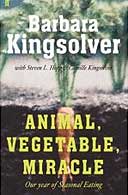
Animal, Vegetable, Miracle
Barbara Kingsolver, with Steven L Hopp and Camille Kingsolver
Faber £16.99, pp370
'Why [do] Americans eat so much bad food on purpose?' This question provokes novelist Barbara Kingsolver's determination to live solely on local food (home-grown if possible) for a year when she and her family move from drought-stricken Arizona to a farm in rural Appalachia. She wants to eat local produce, to return to cycles dictated by the weather rather than by Wal-Mart. From spring asparagus to winter roots, Kingsolver champions a concept of terroir in her 'nation with an eating disorder'. The emphasis on waiting, acceptance and renunciation is almost religious: you can't always get what you want, at least at suppertime. Growing your own involves negotiating the swing between dearth and glut. Months pass without fresh fruit until the cherries ripen in May, while July's cucumber crop seems a benediction ('We'd waited so long for that cool, green crunch'). When veggies arrive it is in battalions, until the kitchen disappears beneath tomatoes, and a frenzied canning operation kicks in.
As Kingsolver walks through the year, her partner, Steven, contributes campaigning sidebars about slow-food activism and industrial perfidy, and her elder daughter some rather good recipes. They may all be singing to the choir, especially for well-trained Observer readers. Anyone who automatically slavers at organics or has stalked Nigel Slater round Marylebone farmers' market will acknowledge the tastebud kick from produce that hasn't been flown to exhaustion. Industrialised agricultural practices are dismaying but not unfamiliar, so Kingsolver tempers her indignation and zeal with down-home idioms ('Boy howdy!') and cosy humour - like her insistence that she's just 'livin' the vida local'. There's rather too much sugar in the mix here.
The more like a novelist Kingsolver writes, the more involving her book becomes. Observation is more convincing than exhortation. She's a sucker for seed catalogues, enraptured by tomato varieties like Green Zebra or Dolly Partons (the latter, predictably, are so pneumatic that they break the vine). Her best writing is evocative, but the struggle to produce all this food is surprisingly straightforward, so thank goodness for the recalcitrant turkeys and their wayward mating habits. Do you know how tricky it is to persuade turkeys to focus on a bit of feather action? It's no wonder that farmers have to call on the services of a professional 'turkey sperm-wrangler' to get the job done.
Kingsolver may rhapsodise, but on livestock she refuses sentimentality, drawing firm lines between pets and dinner. When the turkey chicks arrive, she's worried that her young daughter plans to name the birds, until she hears the names: Mr Thanksgiving, Mr Dinner, Mr Sausage...
As for roosters, there's only room for one male in the flock, so unsuccessful candidates are successively casseroled (now, that's an eviction vote). Dinner doesn't get from barnyard to deep freeze by itself, and Kingsolver gets up to her elbows in viscera on the same day that news filters through from New Orleans in the wake of Hurricane Katrina.
Those for whom home butchery will always be an unattainable dream can nonetheless consider what's on the plate, and how it gets there. The kitchen is even more central to this book than the field, as Kingsolver extends all the domestic skills that won her a 1972 Betty Crocker Homemaker of Tomorrow award. She cheerfully bakes and preserves, but even she knows she's lost us with the cheesemaking.
'If the delivery guy happens to come to the door when I'm cutting and draining curd,' she sighs, 'I feel like a Wiccan.' And by the time she and Steven are stuffing their ex-turkeys into sausage casings, well that may seem like a good life too far.
· To order Animal, Vegetable Miracle for £13.99 with free UK p&p, go to observer.co.uk/bookshop or call 0870 836 0885

